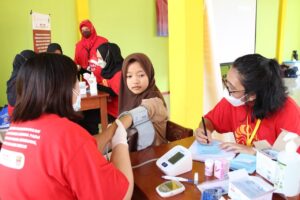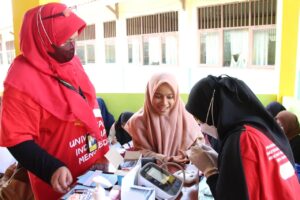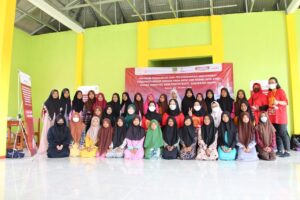Until now, the number of anemia sufferers in Indonesia is considered quite high, especially among adolescent girls. According to the data from the Basic Health Research (Riskesdas) of the Research and Development Agency of Indonesian Ministry of Health in 2018, the prevalence of anemia in adolescent girls was 32%. The data shows that three to four out of ten adolescent girls in Indonesia suffer from anemia. One of the causes of anemia is malnutrition, either due to iron deficiency or helminthiasis, especially in areas with low sanitation and limited access to clean water.
If it is overlooked, anemia will affect adolescents’ health, such as heart and lung problems, pregnancy, growth and development, and difficulty in performing daily activities. This can hinder their development to be productive, creative, and competitive in the future.

Seeing this condition, the community service team of Faculty of Medicine, Universitas Indonesia (FKUI) conducted socialization activities related to the dangers of anemia and worms at SMP Negeri Satu Atap, Pantai Bakti Village, Muara Gembong, Bekasi, West Java. A total of 83 students were involved in counseling and health checks that took place periodically from July to October 2022.
“We chose Pantai Bakti Village, Muara Gembong District as the location for the community service because it is one of the coastal areas in the Jabodetabek area with quite concerning environmental and population conditions. The population is generally low-income and has a low level of education and knowledge of health. Both of these factors can affect the nutritional status of children and their families. Inadequate nutrition can trigger health problems, one of which is anemia. Based on information from the Public Health Center of Muara Gembong, there are still many young women who experience anemia in Pantai Bakti Village, so further treatment is needed,” said dr. Isabella Kurnia Liem, M. Biomed, Ph.D, P.A., as the Head of the Community Service Team who is also a lecturer from Department of Anatomy.

The community service activities carried out included socialization related to anemia delivered by Dr. Rahmadini, M.Biomed from Department of Anatomy FKUI and health checks in the form of physical examinations and checking blood hemoglobin levels. In addition, interviews were also conducted about diet and complaints of diseases that are often suffered. From the results of the interview, it was found that the average student of SMP Negeri Satu Atap Muara Gembong has a habit of not having breakfast and the food consumed tends to not meet the nutritional standards needed by the body for adolescence.
The next activity was a screening examination for helminthiasis and counseling on anemia and its relation to helminthiasis by Dr. Sri Wahdini, M.Biomed, Sp. Akp from Department of Parasitology FKUI . In the community service activity, Principal of SMP Negeri Satu Atap Muara Gembong H. Noto Suprapto, S.Pd, MM, and several other teachers were also present.
“SMP Negeri Satu Atap Muara Gembong is very happy with the arrival of the Community Service Team. The counseling given to students is expected to increase knowledge of anemia and its prevention because the female students are the future mothers,” said Noto.

This community service is supported by the funding from PPM Grants (Community Service and Empowerment Program) Universitas Indonesia, Indomaret, and Bank Mandiri. It is hoped that through this community service, the knowledge of the students of SMP Negeri Satu Atap Muara Gembong will increase, and the students can implement clean and healthy living behavior (PHBS).
In addition, several teachers and students were also selected and fostered to become school health cadres in order to carry out anemia prevention and supervise the implementation of PHBS in a sustainable manner in the school environment.



